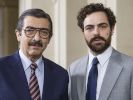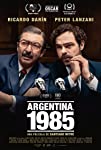Eye For Film >> Movies >> Argentina, 1985 (2022) Film Review
Argentina, 1985
Reviewed by: Jennie Kermode

When one person commits a violent act and everyone knows who they are, prosecution is usually fairly straightforward. When a large number of people commit violent acts and everyone knows who they are, it is anything but. As one torture victim in this film explains, he doesn’t want to take the stand and testify to his experiences because he has to work amongst people who were involved in the violence. Many of them are in influential positions in the new regime.
Argentina’s ruling junta and its National Reorganisation Process officially ended in 1983. The following year, when President Raúl Alfonsín declared that its leaders should face trial in civilian courts for crimes against humanity, moves immediately began to secure an amnesty. This left only a small window in which prosecutions might be brought. Santiago Mitre’s Oscar-nominated film dramatises what followed, combining precise reconstructions based on court records with more imaginative material based on the private experiences of the prosecutors, most notably Julio César Strassera (played here by the estimable Ricardo Darín).

We begin in Strassera’s home, where his family faces death threats. “If they were going to carry them out, they wouldn’t make them,” everyone reassures everyone else, but it doesn’t make the tension go away. The situation is complicated by the fact that his daughter is a teenager and needs to assert her independence, which is difficult with a security detail following her, and that leads to revelations about her private life which worry him and prompt his wife to rage in defence of her privacy. What seems like soap opera on some levels, partly because of the use of synth ballads in the score, is significant in that it emphasises the skewed values at work in society at the time, with moral opprobrium more easily applied to young women’s sex lives than to mass murder.
Mitre is very effective in getting across the gradually debilitating effects of ongoing intimidation. As cars begin to explode around the city, Strassera starts taking his son to school on the metro. He is calm, cool, professional in most of his dealings, but the wrinkles on his face deepen, his eyes grow more shadowed and his posture changes; he clearly isn’t sleeping well. We frequently see him drinking. details like these allow the weight of the situation to become apparent whilst the narrative focuses on day to day procedural details, reflecting Strassera’s unconscious and conscious concerns.
The dialogue grows more animated with the arrival of deputy prosecutor Luis Moreno Ocampo (Peter Lanzani), whose different way of approaching the case leads to frequent disagreements even when they share the same aims. These are not sensationalised but provide an opportunity to fill in facts about the case without resorting to straight exposition. International viewers should note, however, that the film is aimed at an Argentinian audience and expects a certain level of knowledge to begin with. There is very good subtitling, which includes the headlines from newspapers shown onscreen.
Whereas Strassera tends to focus on facts, Ocampo is concerned with appearances, and is acutely aware of the sensitivities of jurors, as well as influence which the media may have upon the outcome of the case. Concerned that lawyers with expertise in human rights will be portrayed as Communists, they decide that the best way forward will be to hire young lawyers as ignorant of the junta as possible, leading to a wonderfully comedic set of recruitment interviews which provide emotional relief before we plunge into the horrors of the trial itself.
Drawing on media sources from the time, Mitre has recreated the courtroom in precise detail, right down to the clothes worn by the various parties in attendance. The accused stand in a line wearing uniforms with an array of medals whose number only totalitarians could fail to perceive as ridiculous, and one by one they deny the legitimacy of the court. Strassera’s team counters with witness testimony which is real and unadorned, speaking for itself without the need for awards-baiting performances. The victims, some of whom were, at the time, blamed for their own suffering, get the opportunity, through the expansion of their audience, to attain a new kind of justice. This is not, however, a film about heroes, and although it reminds us of Strassera’s courage, he will be called to account for his own past behaviour before the trial is over.
Darín excels in this complicated role, revealing his character layer by layer, almost in passing, as the story of the atrocities unfolds. His Strassera is both highly specific and a representative of any number of middle class, politically non-committal Argentinians as they lived through that era. Rape, torture, disappearance, all happen to a different sort of person. Ultimately, Argentina, 1985 does not ask us to empathise with the victims, but to position ourselves alongside those who did nothing to help them when it really mattered, and understand what that means.
Reviewed on: 09 Jan 2023
















